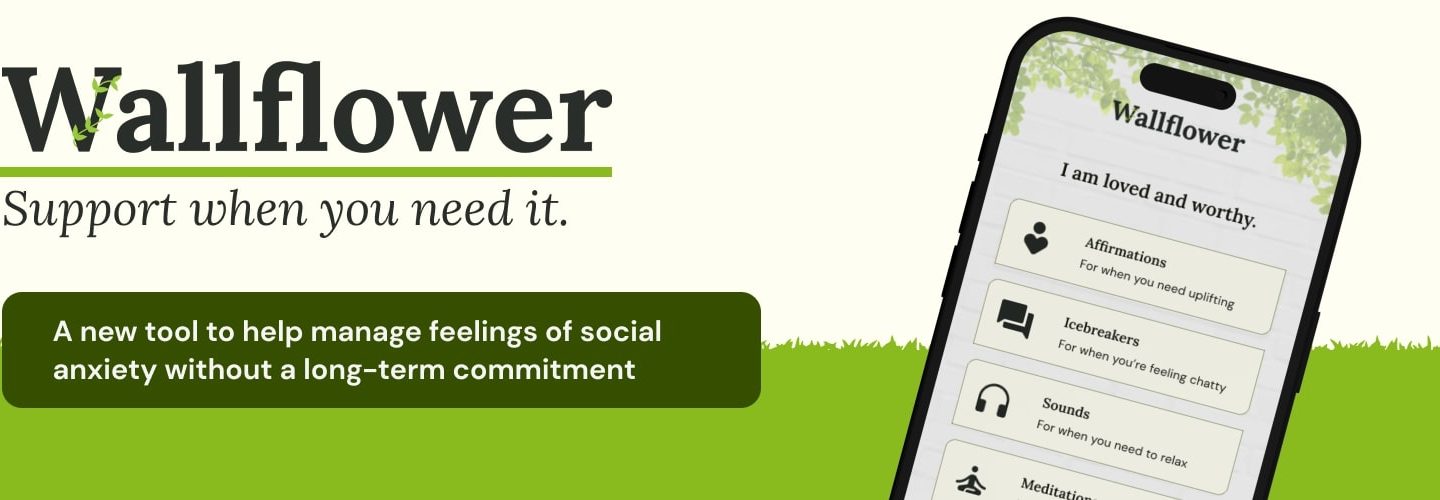
Overview

Wallflower is an app by and for people who struggle with feelings of social anxiety. Our story began when our own Kara Butler felt anxious at a public event. With no-one to talk to, she turned to her phone, but the app store let her down, too. Every feature was in its own app, cost money, or only offered long-term help. There had to be a better way. How can we assist people in managing feelings of social anxiety without long-term commitment?
Our team worked over six months using an agile workflow to bring you Wallflower. This browser-based app offers seven content types to help you manage feelings of social anxiety. You can sort content by tags and save it for later right in your browser – no login required. Wallflower wants to be an app you can trust, with informational resources built-in to learn more.
Our Challenge

What is social anxiety, and how does it affect people? This was Team Wallflower’s first research goal – and first obstacle. Original psychology research can face official ethical guidelines and fell outside our scope. To adapt, we had to limit qualitative and personal data collection. Instead, to define our topic, we turned to the professionals. Our attempts to connect with the Drexel Psychology Department proved unsuccessful. So, we cited medical websites throughout our project, such as the National Institute of Mental Health and the Mayo Clinic. From these sources we compiled a list of situational causes and symptoms of social anxiety.
Meanwhile, we researched and journey mapped competing apps for social anxiety. These apps focused on a single tool, such as soothing sounds, games, or chatting. No app we found addressed them all. Therapy apps focused on paid, long-term care, but no immediate help. With our problems and solutions compiled, we took it to users. We surveyed 49 people targeting Philadelphia students 18-25. We narrowed these results to those experiencing anxiety within the last 30 days. We found that social anxiety means different problems and solutions for different people. Three major trends in the results became our user personas, shown above. We built Wallflower from the ground up to help people like Lorne, Darla, and Barry. If you’re anything like them, we hope Wallflower helps you, too.
Our Process

With our users in mind, we got to work. We decided long-term help was best left to professional therapy. Instead, we chose to provide always-available tools that didn\’t need that commitment.
We compiled all our initial research findings into an affinity map. Then, we narrowed the possibilities by user interest, technical viability, and workable timeframe. By now, we planned for everything Wallflower would be. These plans turned into sketches, and soon enough digital designs.

Meanwhile, we researched ideal visual styles for users with social anxiety. The clematis vine became our internal mascot and design inspiration. This real-life wallflower is known as the \“queen of climbers\”. All it needs is a little help from a supporting trellis. Though later simplified, our initial colors evoked fresh, warm, garden scenes to relax and uplift. Our iconography used simple grass and leaf motifs to be grounding yet gender neutral. Our typography uses sans-serifs for simplicity, and gentle serif headings for welcoming stability. Our layouts focus on simple, straightforward design to work for overwhelmed users.
Once we established our design, we shifted our workflow. To juggle multimedia, usability testing, iteration, and development, we split into teams. Our stations let us work on tasks alone but come together as a team. Each week, our App Team tested, iterated, content injected, developed, and styled pages. Meanwhile, our Projects Team planned, built, critiqued, and improved our media and marketing. By the end, we finished Wallflower with one week to spare.
Our Solution

Meet Wallflower. Our final app features seven content types to relax, uplift, and inspire. Affirmations are motivational phrases to help give you the courage to handle anything. Icebreakers are phrases to start a conversation with someone new. Sounds are soothing tracks in different genres backed by science to help you unwind. Meditations are exercises you can do on your own to ground yourself in the moment. Articles are full of advice from real sources to better understand and take on your anxiety. Puzzles are hands-on distractions to take on one piece at a time. The journal is a way to reflect and document your thoughts, stored securely only on your local browser.
We understand social anxiety can be different for everyone. We understand each person has their own favorite ways to unwind. That’s why you can save all our content types using local browser cookies to look at later. All our content features category filters to make browsing quick and easy. Need help in the moment? Try our S.O.S. section for hotlines you can text or call to your comfort level.
Our Results
Wallflower evolved over time thanks to findings from users and external research. Not every feature made it to our final prototype release. Chatbot functionality was not feasible in our tech scope. Texting integration with friends made it through mid-fidelity prototyping, but risked ethical concerns. That feature, instead, evolved into our hotlines listings – a safer place to direct users in need. A mood-tracking journal add-on even reached full development. However, we cut it when we couldn’t provide the data analytics and content curation it deserved.

The changes even extended to Wallflower’s aesthetics. We reduced the amount of color and some graphic elements for a more relaxing experience. Our biggest pivot was the removal of feature categories to direct feature listings. Our categories were card-sort verified, but still confused users in later usability testing. Our final design used straightforward patterns for simpler development and user experience.
Speaking of our users, how did they like Wallflower? We asked them. We hope our prototype can help make social situations a little easier. If you’ve ever felt like a Wallflower, sometimes all you need to grow is a little extra support.

